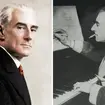Maurice Ravel: An Appreciation
The most exquisite of all French composers; Maurice Ravel was a sensualist-perfectionist without parallel.
Why is it that Ravel’s pieces often sound so different from one another?
Ravel was one of the most complex of all composers. He was anti-Wagnerian, Impressionist and neo-Classicist all at once. His Basque heritage gave him a special affinity with Spanish colours and rhythms; his acute ability to re-engage sensations and memories from childhood resulted in music of playful innocence and ravishing purity; and his fascination with all things logical and mechanical was a profound influence on his musical thinking.
Why does his music sound so “perfect”?
Ravel thrived on setting himself a unique challenge with every new score, so at times you can almost sense him thinking out loud. Stravinsky affectionately referred to him as “the most perfect of Swiss clockmakers”.
Were Ravel and Debussy really sworn enemies?
Relations between the two greatest French composers of the period were undeniably distant if not openly hostile. However, on the basis of imitation being the sincerest form of flattery, Debussy and Ravel clearly admired each other enormously.
What was the “Ravel affair”?
Remarkably, when the young Ravel was already producing masterworks such as the Pavane Pour Une Infante Défunte, Jeux D’eau, String Quartet and Shéhérazade, the Paris Conservatoire failed year after year to award him its most prestigious composition prize, the Prix de Rome. The situation was finally brought to a head when in the same year (1905) as Ravel was working on his exquisite Miroirs, Sonatine and Introduction And Allegro, he was disqualified from the preliminary round of the competition. There was a public outcry, the Conservatoire director Dubois was forced to resign and Fauré took his place.
What’s all this about Ravel being refused a burial at Paris’s star-studded Père-Lachaise Cemetery?
Ravel was buried in the Cimetière de Levallois-Perret in the north of Paris according to his wishes, in a grave beside his parents. It is an unassuming black marble affair inscribed merely “compositeur français”.




















